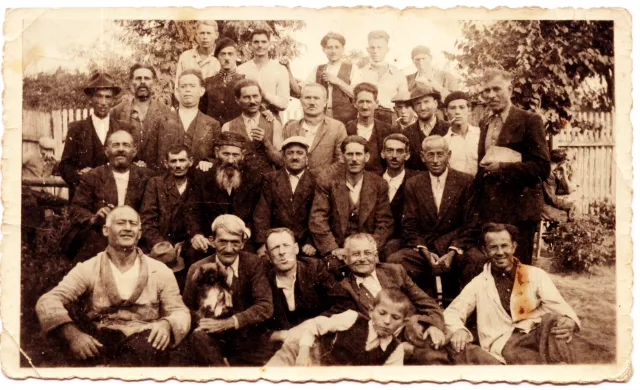Friederich Leinweber
The photo was taken in Bucharest, in the five-week camp in the Aparatorii Patriei quarter, in the summer of 1941. From right to left, the second was Mr. Rubin, the barkeeper, the little boy is the son of Herscovici, the president of the community. Third from the left, in third row, is my stepfather, Friederich Leinweber. In center, on second row, with traditional clothes and beard, is Mr.Rotstein, our religious servant.
My biological father died in April 1921 and my mother remarried in 1924. The one who adopted me and whose name I bear was a worthy man, Friederich Leinweber. His behavior was beyond reproach and I never felt he was my stepfather. He never did raise his voice at me, curse me, pull my ears or slap me. On the contrary, whenever I beat up my brothers - his children -, he left the house and looked for something to do elsewhere, lest he should lose control and say something bad or hit me.
There were many Jewish families in the Aparatorii Patriei quarter - over 60 families -, so the need was felt for someone to perform religious duties. The neighborhood was founded in 1927, at the outskirts of the capital, on a ground divided into lots. There was no pavement, no electricity, no sewerage, and no drinking water. There was a well here and there, from which water was extracted from a depth of 25 meters. We couldn't afford an outside man, so a cooper from our neighborhood, named Rotstein, who had a lot of children and was familiar with the elements of the Judaic cult, became our religious servant. But on holidays, we still had to bring a hakham to slaughter our poultry. And since this cost pretty much, Mr. Rotstein went to a hakhamim school, probably at the Community. He was authorized to perform the ritual slaughtering, so he was both the religious servant and the hakham of the neighborhood. He was also the one who continued to teach children to read and write in Hebrew.
In June 1941, after the outbreak of the anti-Soviet war, Bucharest was bombed by the Russian Air Force. The bombs hit Justitiei St., located close to 11 Iunie St., right at the foot of the Metropolitan Cathedral's Hill, a house in our neighborhood [at the outskirts of the city] and a wing of the Hospital no.9 for mental illnesses. I don't know whether there were any rumors or suspicions concerning the Jews. What's certain is that, on 22nd July 1941 [Ed. note: in observance of Order no.4599/1941 of the Internal Affairs Ministry], all the Jews in the neighborhood were gathered [by the gendarmes]. All the [male] Jews from 18 years old to the oldest age were herded inside our synagogue and in its courtyard and forced to stay there. In two or three days our group was enlarged with some other men from Giurgiului Dr., the Progresul [quarter], Pieptanari Dr., Colentina Dr., the Bucurestii Noi and the Traian quarters, and Oltenitei Dr. We were more than 60 people and we were detained there for five weeks, guarded by the gendarmes. Only family members were granted access to us. No one from the Community or the Jewish Central Organization showed any interest in our fate. I saw hunger with my own eyes, in those whose wives or mothers had nothing else to bring from home. I remember the moments when one shared with his neighbor or friend what he had got from home, and the moments when one had to hide from the others in order to secretly eat something. However, our situation got better thanks to a former [Jewish] tenant from our neighborhood named Ascher, who managed to provide us food every day at his own expense. When the late Asher, may God rest his remains and his soul, brought us the necessary food, our morale went up, humiliations disappeared, and we simply lived there under the gendarmes' watch. As I am probably the last inmate alive, I try to remember the names and occupations of those people in the camp [Ed. note: When using the term 'camp', Mr. Leinweber refers to the enclosure where the Jews were forced to live under military surveillance and which they were not allowed to leave, not a concentration/extermination camp proper], and various situations of that time.
After 5 weeks, at the end of August, an official decision [Ed. note: Order no.31200/1941 of the Joint Chiefs of Staff] freed us from the camp and put us under the authority of the Drafting Center, which sent us to various detachments; it was the beginning of the forced labor





























